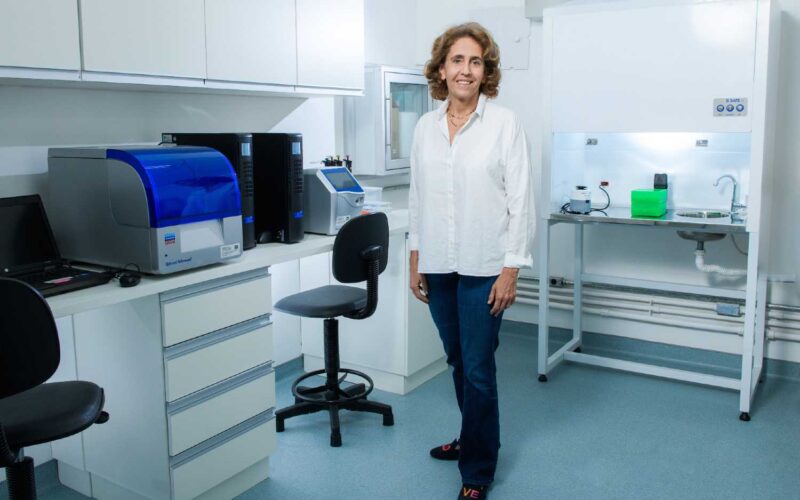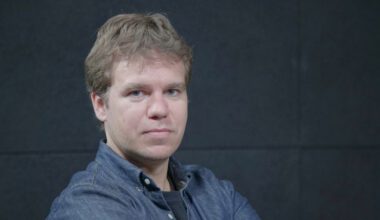This interview is the seventh in a series spotlighting the ten winners of the WeXchange Women STEMpreneurs Competition 2024. WeXchange is an initiative of the IDB Lab, the innovation and venture arm of the Inter-American Development Bank, to unlock growth opportunities for women entrepreneurs in STEM in Latin America and the Caribbean.
Genomic research is reshaping precision medicine worldwide, yet much of it remains concentrated on populations of European descent. In Brazil, a country with a uniquely diverse genetic heritage, this gap has significant implications.
In this conversation Lygia Pereira, CEO and Founder of gen-t shares her journey from physics to human genetics illustrating the challenges and breakthroughs in genomic research, culminating in the launch of gen-t, a startup aimed at advancing precision medicine by leveraging Brazil’s vast genetic diversity.
From physics to human genetics
I earned a bachelor’s degree in physics, but during my undergraduate studies in Brazil, I became fascinated with human genetics. This led me to pursue a PhD in human genetics at Icahn School of Medicine at Mount Sinai in New York. After completing my PhD, I returned to Brazil and joined the University of São Paulo, where I have been a full professor of human genetics for 29 years.
At the University of São Paulo, my group led several high-profile projects. We were the first in Brazil to establish knockout mouse models for human diseases. When human embryonic stem cells emerged in 1998, we leveraged our experience with mouse pluripotent stem cells to establish human embryonic stem cell lines. Our lab became the national embryonic stem cell research reference, supplying cells to the scientific community and training researchers.
Uncovering a lack of diversity in stem cell research
In 2007, while analyzing Brazilian embryonic stem cell lines, we discovered that 98% of their genomes were of European ancestry. This was unexpected, given Brazil’s diverse population, which includes African, Native American, and European ancestries. We hypothesized that these stem cells came from embryos in private IVF clinics, primarily used by wealthier, and thus whiter, Brazilians. This realization sparked my interest in the genomic diversity of our population.
For years, discussions in Brazil explored the possibility of a national genome project, similar to initiatives in the UK, Finland, and Iceland. However, these efforts required substantial funding and infrastructure. By 2017, studies highlighted the lack of diversity in genomic research, showing that most data came from European populations. This meant precision medicine was being developed primarily for people of European descent, leaving much of the world underrepresented. This was the ideal moment to launch a Brazilian genome project.
The unique genetic makeup of the Brazilian population
Brazil received six million enslaved Africans—15 times more than the United States—creating the largest African-descendant population outside Africa. Over 500 years of genetic mixing with Europeans and Native Americans further shaped the population. In 2019, I launched DNA do Brasil, an academic project supported by the Ministry of Health, aimed at incorporating Brazil’s genetic diversity into precision medicine through whole-genome sequencing.
We sequenced 3,000 Brazilian genomes, uncovering important findings. We identified African genetic contributions not found in Africa, remnants of forced migration, and mixing during the slave trade. We also recovered fragments of extinct Native American genomes. Ancestry composition varied by region: the south showed more European ancestry, the northeast more African, and the north more Native American. We discovered over eight million novel DNA variants, emphasizing the importance of studying non-European populations in genomic research.
While DNA do Brasil was groundbreaking, it was slow, sequencing only 3,000 genomes in four years. In contrast, the UK Biobank has sequenced 500,000 genomes. Recognizing the value of genomic data for pharmaceutical research, I transitioned the leadership of the academic project to a colleague and launched gen-t, a startup focused on incorporating Brazil’s genetic diversity into precision medicine and accelerating pharmaceutical innovation.
Building the GenT Platform
gen-t is developing a platform containing health, lifestyle, and multi-omics data from 200,000 Brazilians. Designed for R&D, it includes broad consent for commercial use while adhering to ethical and data privacy regulations. We collect longitudinal health records, biological samples, and electronic health data. In addition to DNA, we store plasma for proteomics, metabolomics, and other analyses. This platform aims to accelerate pharmaceutical innovation and enhance precision medicine in Brazil.
Genetics alone does not determine health; lifestyle plays a key role. We collect extensive lifestyle data to study epigenetic impacts. gen-t seeks to provide insights that both the pharmaceutical industry and public health sectors can use to improve healthcare management, reduce costs, and drive drug development. Initially, gen-twill support clients’ innovation, but as the platform grows, we plan to co-develop intellectual property with pharmaceutical partners.
Early success and industry impact
We secured our first investment round in late 2021 and spent 2022 building the necessary infrastructure, addressing legal and regulatory challenges, and assembling our team. By January 2024, we had recruited 12,000 participants, offering free annual checkups as incentives. 20% of participants who reported not having hypertension were found to have it upon testing, enabling early intervention.
We provide participants with easy-to-understand health reports, including graphical representations of blood test results. Our mission is to drive diversity in genomic research, an area that has remained unchanged since I first addressed it in 2017. We strive to be the leading reference in genomic diversity-driven innovation, making this data available to both industry and academia while conducting our own research to identify new drug development opportunities.
By the end of 2025, we aim to have the largest genomic database of the Brazilian population.
We currently have no plans to expand internationally. Brazil’s genetic diversity is unparalleled in Latin America, and we benefit from being a national leader in human genetics. We are committed to leveraging this position while supporting other countries interested in replicating our model. However, these efforts should be led by local experts who understand the unique needs of their populations.
Our next milestone is to scale recruitment, to reach 200,000 participants by 2027. We are expanding our recruitment network, and training third-party teams such as a group in Salvador. gen-t operates at the intersection of public research and private business, which presents both investment challenges and opportunities for grants and non-dilutive funding due to its social impact. Our investors recognize that gen-t will not only drive innovation but also generate meaningful social benefits.
Connecting with gen-t
For more information visit gen-t’s website or or connect with Lygia on LinkedIn



